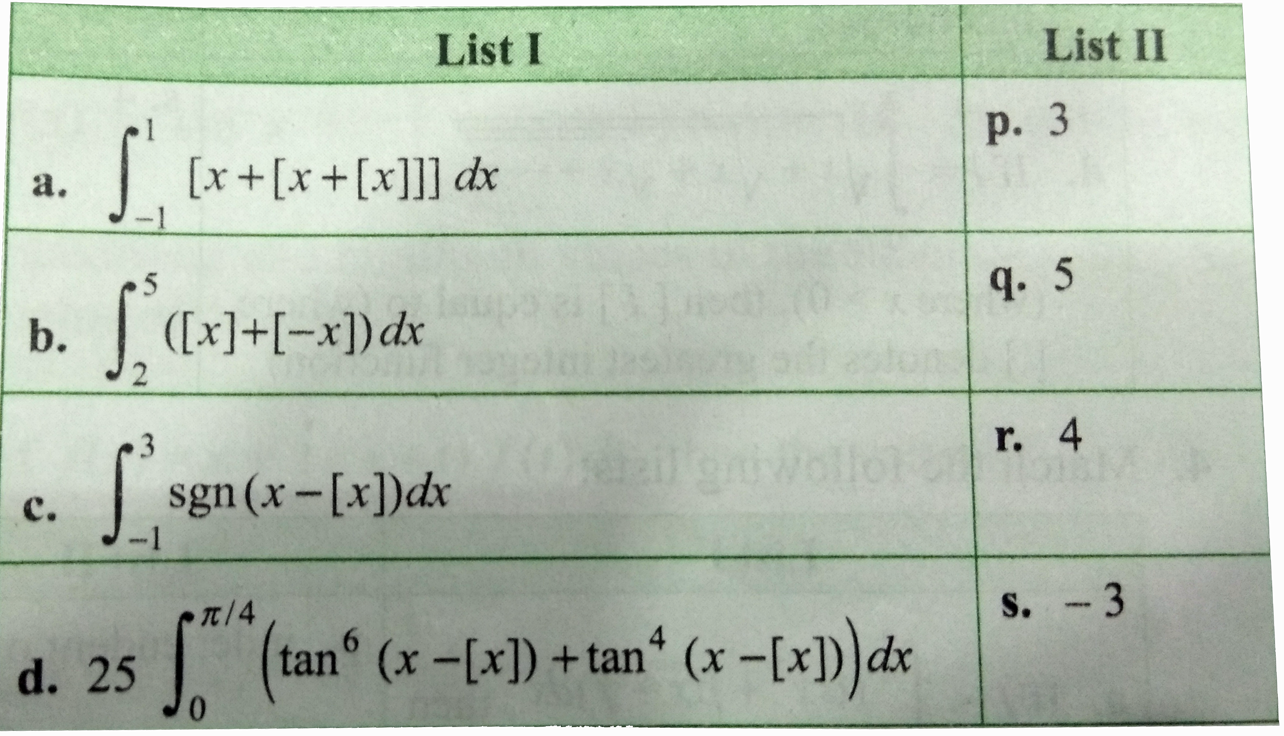A Function f(x) satisfies the relation f(x)=ex+∫10exf(t)dt.Then f(0)<0 f(x) is a decreasing function. f(x) is an increasing function. ∫10f(x)dx>0Solution in Bengali
f(0)<0
f(x) is a decreasing function
f(x) is increasing function
∫10f(x)dx>0
The correct Answer is:A, B
f(x)=ex+∫10exf(t)dt−ex+kex, where k=∫10f(t)dt
∴k=∫10(et+ket)dt=e+ke−1−k
∴k=e−12−e
Thus f(x)=ex(1+e−12−e)=ex2−e
obviously,f(0)=12−e<0
Also f'(x)=ex2−e<0 for ∀xεR.
Hence f(x) is a decreasing function.
Also∫10f(x)dx=∫10ex2−edx
=[ex2−e]10
=e−12−e<0
Topper's Solved these Questions
- BOOK - CENGAGE PUBLICATIONCHAPTER - DEFINITE INTEGRATION EXERCISE - LC_TYPE31videos
DEFINITE INTEGRATION
- BOOK - CENGAGE PUBLICATIONCHAPTER - DEFINITE INTEGRATION EXERCISE - MATRIX MATCH_TYPE6videos
DEFINITE INTEGRATION
- BOOK - CENGAGE PUBLICATIONCHAPTER - DEFINITE INTEGRATION EXERCISE - SCQ_TYPE113videos
DEFINITE INTEGRATION
- BOOK - CENGAGE PUBLICATIONCHAPTER - CURVE TRACINGEXERCISE - EXERCISES24videos
CURVE TRACING
- BOOK - CENGAGE PUBLICATIONCHAPTER - DETERMINANTEXERCISE - Multiple Correct Answer5videos
DETERMINANT
Similar Questions
y=f(x) satisfies the relation ∫x2f(t)dt=x22+∫2xt2f(t)dt
The range of y=f(x) is (a) [0,∞) (b)R (c)(−∞,0] (d) [−12,12]04:22View SolutionIf [.] denotes the greatest integer function, then match the following lists:
 02:36View Solution
02:36View SolutionLet f(x)=limn→∞1n((x+1n)2+(x+2n)2+……….+(x+n−1n)2)
Then the minimum value of f(x) is04:34View SolutionFind the derivative of y=sin2x−cosx
01:54View SolutionIf x∈R,ai,bi,ci∈R for i=1,2,3 and ∣∣ ∣∣a1+b1xa1x+b1c1a2+b2xa2x+b2c2a3+b3xa3x+b3c3∣∣ ∣∣=0, then which of the following may be true ?
07:36View SolutionA Function f(x) satisfies the relation f(x)=ex+∫10exf(t)dt. Then (a)f(0)<0 (b)f(x) is a decreasing function. (c)f(x) is an increasing function. (d)∫10f(x)dx>0
03:01View SolutionA continuous function f(x) satisfies the relation f(x)=e^(x)+int_(0)^(1)e^(x)f(t)dt then f(1)=
06:18View SolutionIf f(x) is a continuous function defined on [0, 2a]. Then prove that ∫2a0f(x)dx=∫a0{f(x)+(2a−x)}dx
05:33View SolutionIf a continuous function f on [0,a] satisfies f(x)f(a−x)=1,a>0, then find the value of ∫a0dx1+f(x)
07:31View SolutionA Function f(x) satisfies the relation f(x)=ex+∫10exf(t)dt. Then (a)f(0)<0 (b)f(x) is a decreasing function. (c)f(x) is an increasing function. (d)∫10f(x)dx>0
08:26View SolutionA continuous function f(x) satisfies the relation f(x)=ex+∫10exf(t)dt then f(1)=
11:22View SolutionA function f(x) satisfies f(x)=sinx+∫x0f′(t)(2sint−sin2t)dt is
01:24View SolutionIf f(x) is a continuous function defined on [0, 2a]. Then prove that ∫2a0f(x)dx=∫a0{f(x)+(2a−x)}dx
02:42View SolutionA function f (x) that relates f(x) = e^(x) + int_(0)^(1) e^(x) f(t)dt , If satisfies
03:08View Solutionf(x)=∫x0etf(t)dt+ex,f(x) is a differentiable function on x∈R then f(x)=
04:26View Solutionf(x)=e−xsinx,F(x)=∫x0f(t)dt,.Find ∫10ex(F'(x)+f(x))dx lies in interval
03:02View Solution

